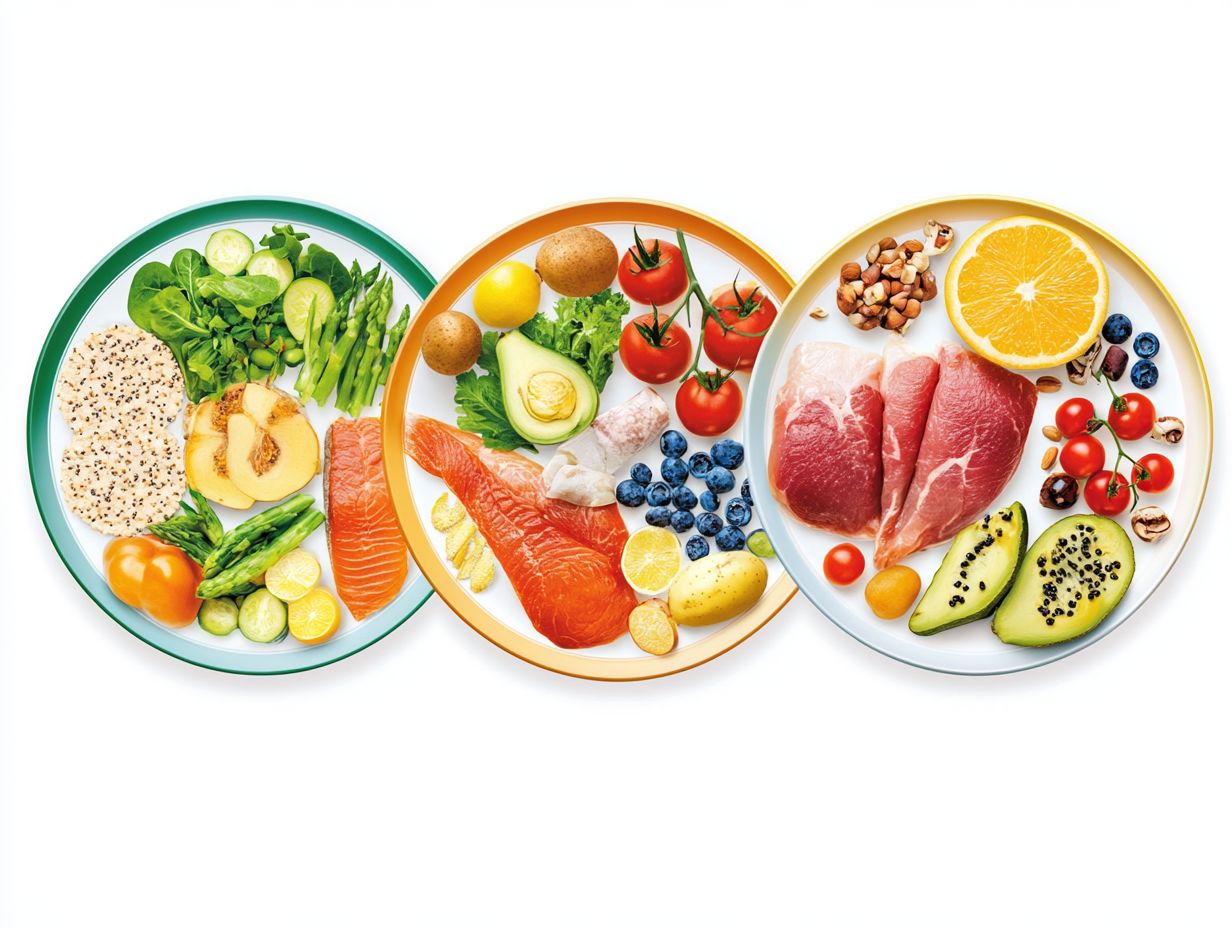3 Dietary Plans for Managing Weight Effectively
Choosing the right diet can feel overwhelming, especially with so many options claiming to be the ultimate solution for weight management.
In this article, let s dive in and discover three popular dietary plans: the Mediterranean Diet, the DASH Diet, and the Flexitarian Diet. Each offers unique benefits and principles designed to promote healthy eating while helping you achieve your weight goals.
You ll also explore how these diets fit into your lifestyle, their potential drawbacks, and practical tips for staying committed. Discover the most effective approach to managing your weight with confidence!
Contents
- Key Takeaways:
- 1. The Mediterranean Diet
- 2. The DASH Diet
- 3. The Flexitarian Diet
- What Is the Best Diet for Weight Management?
- What Are the Key Principles of the Mediterranean Diet?
- What Are the Key Principles of the DASH Diet?
- What Are the Key Principles of the Flexitarian Diet?
- How Do These Diets Help with Weight Management?
- What Are the Potential Drawbacks of These Diets?
- How Can One Choose the Right Diet for Their Weight Management Goals?
- Are These Diets Sustainable in the Long Term?
- What Other Factors Should Be Considered for Effective Weight Management?
- How Can One Incorporate These Diets into Their Lifestyle?
- What Are Some Tips for Sticking to a Dietary Plan for Weight Management?
- Frequently Asked Questions
- What are the three dietary plans for managing weight effectively?
- How does the Mediterranean diet help with weight management?
- What is the ketogenic diet and how does it aid in weight management?
- Can intermittent fasting be an effective dietary plan for weight management?
- Are there any potential risks associated with these dietary plans?
- What are some tips for successfully following these dietary plans for weight management?
Key Takeaways:

- The Mediterranean Diet focuses on whole, unprocessed foods, emphasizing plant-based options, healthy fats, and moderate portions of lean protein.
- The DASH Diet promotes balanced eating by highlighting fruits, vegetables, low-fat dairy, whole grains, and limiting saturated and trans fats.
- The Flexitarian Diet encourages a mostly plant-based pattern with occasional high-quality animal products, promoting weight management through portion control and nutrient-dense foods.
1. The Mediterranean Diet
The Mediterranean Diet is a celebrated dietary pattern known for its focus on wholesome foods. It invites you to enjoy a vibrant array of fruits and vegetables, whole grains, and healthy fats, while avoiding processed items. It’s not just a diet; it s a sustainable nutritional strategy that champions long-term health benefits and effective weight management.
Olive oil is your go-to source of healthy fat, packed with essential nutrients and antioxidants. This diet promotes a high intake of fiber from legumes and whole grains, essential for digestive health and steady energy. Research consistently links adherence to this diet with a reduced risk of chronic diseases, including heart disease and diabetes.
Mindful eating practices, often part of the Mediterranean lifestyle, help cultivate a deeper appreciation of food, inviting you to savor slow and enjoyable meals. By choosing local and seasonal ingredients, you enhance your own health and contribute to sustainable living, making the Mediterranean Diet a truly holistic approach to well-being.
2. The DASH Diet
The DASH Diet, which stands for Dietary Approaches to Stop Hypertension, zeros in on reducing sodium intake while encouraging a colorful variety of food groups rich in essential nutrients. This is a smart strategy for managing weight and reducing health risks linked to chronic diseases.
This nutrition plan invites you to enjoy generous daily servings of fruits, vegetables, and whole grains. This not only enhances flavor but also ensures you re getting crucial vitamins and minerals. Portion control is key, allowing you to maintain a balanced caloric intake without sacrificing the joy of eating.
This holistic approach is effective for managing blood pressure, boosting your energy levels, and enhancing your overall well-being. By cultivating healthier eating habits, the DASH Diet offers long-term health benefits that extend far beyond your meals.
3. The Flexitarian Diet
The Flexitarian Diet provides a flexible eating pattern that primarily emphasizes plant-based foods while still allowing for occasional indulgences in meat and fish. This approach promotes healthy eating habits that support weight loss and incorporate a variety of nutrient-dense foods, ultimately enhancing your overall wellness.
By focusing on wholesome fruits, vegetables, legumes, and whole grains, you’ll boost your nutritional intake and nurture a more sustainable lifestyle. You’ll find it easier to adapt your meals, relishing the vibrant flavors of plant-based dishes while still enjoying lean meats or seafood on occasion.
Mindful eating plays a vital role here, helping you cultivate a deeper awareness of your hunger cues and food choices. This awareness leads to sustainable habits, contributing not just to effective weight management but also to increased energy levels and improved overall health.
Start your journey towards healthier eating today; choose a diet that resonates with you and take the first step towards a vibrant lifestyle!
What Is the Best Diet for Weight Management?
Determining the best diet for weight management requires thoughtful consideration of your individual preferences, health goals, and lifestyle changes. Popular options like the Mediterranean Diet, DASH Diet, and Flexitarian Diet provide diverse approaches that can effectively support sustainable weight loss and enhance overall health.
Each of these diets has unique strengths and weaknesses, catering to various dietary needs. The Mediterranean Diet shines with its focus on healthy fats, whole grains, and an abundance of vegetables, promoting heart health while allowing you flexibility in food choices. In contrast, the DASH Diet specifically targets high blood pressure by reducing sodium and processed foods, making it a solid choice for anyone prioritizing cardiovascular health. If you prefer a more moderate approach, the Flexitarian Diet encourages a primarily plant-based regimen with occasional meat, perfect for those wanting to dial back on animal protein without fully committing to vegetarianism.
To help you stay on track, utilizing apps for tracking food intake can be invaluable. These tools assist in managing emotional eating and encourage mindful choices. Setting practical goals is essential for your journey, allowing you to celebrate those small victories toward a healthier lifestyle.
What Are the Key Principles of the Mediterranean Diet?

The Mediterranean Diet is founded on essential principles that celebrate the consumption of wholesome foods like fruits, vegetables, whole grains, and healthy fats. It encourages mindful eating that promotes balanced nutrition and helps mitigate the risk of chronic diseases.
By adopting a structured approach to dining, you can enhance the variety of nutrients you intake, while portion control ensures moderation. Healthy fats, especially olive oil, play a crucial role here, providing essential fatty acids and antioxidants that support heart health.
Integrate these elements into your lifestyle, and you’ll love how easy it is to achieve better health outcomes and significantly reduce the risk of heart disease and diabetes.
What Are the Key Principles of the DASH Diet?
The DASH Diet invites you to embrace key principles such as reducing sodium intake, enhancing your meals with foods rich in essential minerals, and mastering portion control. These elements work together to develop healthier eating habits and effectively manage blood pressure.
By incorporating a diverse array of whole grains, fruits, vegetables, lean proteins, and low-fat dairy products, the diet encourages you to create a balanced plate. Picture this: daily servings comprising roughly six to eight servings of whole grains, four to five servings of fruits, and the same for vegetables. This ensures that your body receives essential nutrients.
This mindful approach not only aids in weight management but also fosters a deeper connection to your food. Meal planning becomes an opportunity for mindful eating. By adopting the DASH Diet, you can enhance your overall health, maintain your weight, and enjoy satisfying, nutritious meals in the process. Try it today!
What Are the Key Principles of the Flexitarian Diet?
The Flexitarian Diet is rooted in principles that elevate plant-based foods while allowing you the flexibility to include animal products. This promotes healthy eating patterns tailored to your individual preferences, supporting long-term lifestyle changes.
This approach encourages you to diversify your protein sources, seamlessly integrating legumes, grains, nuts, and seeds with occasional meat, eggs, and dairy. By doing this, you not only enhance your nutrient intake but also develop a deeper connection to food through mindful eating practices.
The frequency of your meals also plays a crucial role in your overall health and weight management. Opting for smaller, balanced meals throughout the day can help maintain stable energy levels and prevent overeating, further supporting a sustainable and healthful lifestyle. Embrace the Flexitarian Diet, and discover how fulfilling healthy eating can be!
How Do These Diets Help with Weight Management?
Popular diets like the Mediterranean, DASH, and Flexitarian diets help with weight management. They focus on calorie intake, portion control, and healthy foods that promote fullness and reduce cravings. These diets are designed to be sustainable for long-term weight loss.
By encouraging you to choose whole grains, lean proteins, healthy fats, and a vibrant array of fruits and vegetables, these diets enhance the goodness of the food you eat while helping you feel full and satisfied without piling on extra calories.
For instance, the Mediterranean diet highlights olive oil and nuts, which provide healthy fats known for controlling hunger. The DASH diet takes a more structured approach, managing sodium intake and promoting potassium-rich foods to help reduce cravings. Meanwhile, the Flexitarian diet allows you to ease into a more plant-based focus at your own pace.
To keep your motivation high, track your progress, celebrate small victories, and maintain a food journal. This creates a sense of accountability, transforming your weight loss journey into a fulfilling and achievable adventure.
What Are the Potential Drawbacks of These Diets?
While the Mediterranean, DASH, and Flexitarian diets can work wonders for weight management, they may also present challenges, like dietary restrictions and the struggle with cravings and emotional eating.
You might feel deprived or frustrated at times, which can affect your commitment to these diets. Remember, cravings are totally normal! You can manage them with mindful eating strategies.
Allowing yourself small, satisfying portions of your favorite treats now and then can ease feelings of deprivation. Surrounding yourself with a supportive community whether through online forums or local groups provides encouragement and practical tips for navigating these common hurdles, helping you cultivate a healthier and more enjoyable relationship with food.
How Can One Choose the Right Diet for Their Weight Management Goals?

Choosing the right diet can transform your weight management journey! Start by evaluating your own dietary preferences, health goals, and capacity for making lasting lifestyle changes. Options like the Mediterranean, DASH, and Flexitarian diets offer diverse pathways to success.
It’s essential to understand that a successful diet extends beyond mere food choices; it encompasses lifestyle factors as well, including your daily routines, activity levels, and social contexts. Recognizing these nuances can help you choose a diet that feels less like a restriction and more like an empowering decision. For instance, if you re eager to incorporate more plant-based meals, a Flexitarian approach might align beautifully with your ethics and preferences.
When you align your dietary choices with long-term health goals such as enhancing cardiovascular health, improving the goodness of your food, or supporting mental well-being you significantly boost your overall motivation. To maintain your commitment, set achievable milestones, track your progress, and celebrate those small victories. This approach provides a morale boost that encourages consistency and instills a sense of accomplishment.
Are These Diets Sustainable in the Long Term?
Evaluating the sustainability of diets such as the Mediterranean diet, DASH diet, and Flexitarian diet is essential for you. These diets must align with your long-term lifestyle changes and actively promote healthy eating habits to maintain effective weight management.
Ultimately, the success of these dietary approaches depends on several key factors, including ease of adherence. This aspect allows you to seamlessly integrate these diets into your daily routine without feeling restricted. A diverse range of food choices is equally important, as it keeps your meals exciting and ensures you receive a well-rounded intake of nutrients.
Each of these diets offers significant health benefits, such as improved heart health and enhanced metabolic function. This underscores the importance of adopting sustainable eating habits for lasting well-being. By making these diets a fundamental part of your everyday life, you can create a more health-conscious environment, increasing your chances of achieving your wellness goals.
What Other Factors Should Be Considered for Effective Weight Management?
Effective weight management isn’t just about what you eat; it’s an overall approach that requires you to consider various factors, including physical activity, emotional eating patterns (how emotions influence our food choices), and the importance of tracking your intake to achieve your health goals.
Incorporating regular exercise into your routine not only boosts your metabolism but also elevates your mood. This makes it easier to fend off those pesky unhealthy food cravings. Understanding your emotional and environmental triggers can significantly influence your eating behaviors; for instance, stress or social situations might lead to overeating.
To tackle this, consider journaling your feelings or practicing mindfulness to pinpoint your eating triggers. Joining a support group can also prove invaluable, offering you encouragement and accountability in your journey.
Establishing a routine that embraces these elements like scheduled workouts, mindful eating practices, and regular check-ins with your support network can help you create a balanced approach to weight management that is both sustainable and effective.
How Can One Incorporate These Diets into Their Lifestyle?
Incorporating the Mediterranean diet, DASH diet, or Flexitarian diet into your lifestyle requires strategic meal planning, a keen understanding of portion sizes, and a commitment to selecting healthy foods that align with your personal preferences and health goals.
This journey can be streamlined by creating a weekly meal prep schedule that maximizes your time and resources. Crafting a grocery shopping list tailored to these diets ensures that essential pantry staples like whole grains, fresh vegetables, and lean proteins are always on hand.
When dining out, get to know the menu descriptions to discover exciting, healthier options. Look for dishes that highlight seasonal ingredients or prioritize plant-based components. Practicing mindful eating, such as savoring each bite and tuning into your hunger cues, can elevate your dining experience.
Making gradual adjustments rather than drastic changes cultivates a sense of achievement and promotes lasting success.
What Are Some Tips for Sticking to a Dietary Plan for Weight Management?
Sticking to a dietary plan for weight management can indeed be a challenge, but implementing strategies like establishing meal frequency, managing cravings, and utilizing motivational tips can significantly enhance your adherence and long-term success.
One effective approach is to set achievable goals that gradually build your confidence and momentum, rather than burdening yourself with lofty expectations. Tracking your progress not only helps in measuring success but also provides valuable insights into your eating habits, fostering a sense of accountability.
Cultivating mindfulness around your food choices is equally essential. Taking the time to savor your meals and truly listen to your hunger cues can lead to healthier decisions. Engaging with a supportive community or support group can greatly boost your motivation and provide encouragement, making the entire journey feel less isolating and far more attainable.
Frequently Asked Questions

What are the three dietary plans for managing weight effectively?
The three dietary plans are the Mediterranean diet, the ketogenic diet, and intermittent fasting.
How does the Mediterranean diet help with weight management?
The Mediterranean diet focuses on whole, natural foods. This includes fruits, vegetables, whole grains, lean proteins, and healthy fats.
This diet is not just healthy it can help you shed pounds effectively!
What is the ketogenic diet and how does it aid in weight management?
The ketogenic diet is a way of eating that is high in fats, moderate in proteins, and very low in carbs. This means your body uses fat for energy instead of sugar.
This approach helps with weight management by promoting fat loss and reducing hunger cravings.
Can intermittent fasting be an effective dietary plan for weight management?
Yes! Intermittent fasting alternates between eating and fasting periods.
This method can reduce calorie intake and boost your metabolism.
Are there any potential risks associated with these dietary plans?
While effective, these dietary plans may not suit everyone. Always consult with a healthcare professional to ensure your new diet is safe for you.
What are some tips for successfully following these dietary plans for weight management?
To manage weight effectively, focus on portion control and stay hydrated! Incorporate fun physical activities into your routine and aim for sustainable lifestyle changes.






